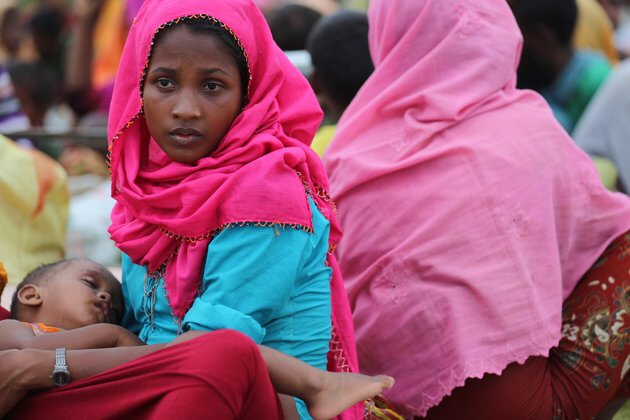The U.N. Needs A Peacekeeping Force, Not Just Words, To Protect Myanmar’s Rohingya by Farahnaz Ispahani
As reports of atrocities against Rohingya Muslims in Myanmar’s western Rakhine state pour in, one thing is clear: The international community needs to respond more robustly.
The United Nations refugee agency has reported that more than a quarter of the Rohingya in Myanmar — 270,000 people — have fled their homes so far. The horrors we’re seeing in Rakhine are similar to those we witnessed in the 1990s during the slaughter of the Tutsi minority in Rwanda and the ethnic cleansing of Bosnia’s Muslims and Croats.
Rendered stateless because Myanmar refuses to recognize them as citizens, the Rohingya are being forced to flee as their villages are burned. Reports of rape, murder and arson have increased as refugees arrive by land or sea in Bangladesh, Indonesia, Malaysia and Thailand.

Rohingya refugees flee to Bangladesh. Sept. 10.
The horrors we’re seeing in Rakhine are similar to those we witnessed during the Rwandan genocide and ethnic cleansing in the Balkans.
But the situation demands a stronger response than merely condemning the actions of the Myanmar government. The atrocities in Bosnia did not end without NATO’s involvement, and the genocide in Rwanda did not cease until the U.N. sent in a peacekeeping force.
Much of the world’s response to the Rohingya crisis has centered on well-deserved criticism of Nobel laureate and Myanmar’s de-facto leader, Aung San Suu Kyi. Public figures have penned newspaper editorials calling to revoke Suu Kyi’s Nobel Prize. Two Nobel laureates, Malala Yousafzai and Desmond Tutu, have criticized Suu Kyi’s role in the humanitarian crisis. Tutu came out of retirement to voice his criticism of a woman he described as “a dearly beloved sister” he has long admired but whose behavior he strongly condemns in the “unfolding horror” of this “ethnic cleansing.”
Tutu admonished Suu Kyi, saying it was “incongruous for a symbol of righteousness to lead” a country that allowed such atrocities. “If the political price of your ascension to the highest office in Myanmar is your silence, the price is surely too steep,” he said.
This situation demands a stronger response than merely condemning the actions of the Myanmar government.
Suu Kyi’s attempts to spin the violence against the Rohingya is ingenuous, at best. Reports of attempted genocide and mass exodus of the Rohingya, which began to surface in 2009, are based on eyewitness accounts and are documented on video. Refugees arriving in Bangladesh have recounted matching stories of children being beheaded and men and women being burned to death.
The Rohingya are unwanted in Bangladesh and other neighboring countries as well. With little economic or social standing and virtually no rights even in their homeland, these people have no voice. They are friendless under the might of military guns.
Although the history of the Rohingya can be traced back to the eighth century, Myanmar law does not recognize the ethnic minority as one of its national races. The government’s attitude, as well as silence from the international community, reflects the mistreatment and marginalization of ethnic and religious minorities that have, unfortunately, resurfaced as a global phenomenon today.
It’s shocking. I’ve never encountered a situation like this. Linnea Arvidsson, U.N. investigator
The result of events like the tragedy in Myanmar is communal majoritarianism. As Linnea Arvidsson, a U.N. investigator who met refugees in Bangladesh, put it: “It’s shocking. I’ve never encountered a situation like this, where you do 204 interviews and every single person you speak with has a traumatic story, whether their house was burnt, they’ve been raped or a relative was killed or taken away.”
The U.N. Security Council must heed the advice of Secretary-General António Guterres to step up its response. “The international community has a responsibility to undertake concerted efforts to prevent further escalation of the crisis,” Guterres warned. This might involve sending international forces to protect the Rohingya from Myanmar’s security forces and allied mobs intent on eliminating another minority.
But after the immediate issue has been attended to and international forces have intervened to save the Rohingya from being eliminated or permanently excluded from their homeland, there will remain a need to work on the larger issue of communalism. Majorities must not be allowed to attack minorities to create religiously or ethnically pure societies. Finding a mechanism to prevent future Rwandas and Rakhines will be the real test for our civilization.